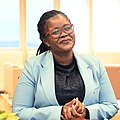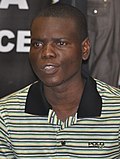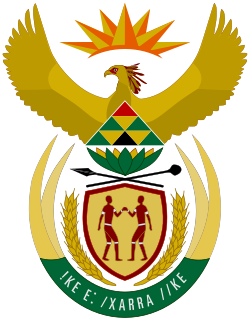| Office | Portrait | Holder and party of origin | Term started and
days in office |
|---|
| President |  | Cyril Ramaphosa
(born 1952) | ANC | 15 February 2018 (2018-02-15): 2,876 days |
|---|
| Deputy president |  | Paul Mashatile
(born 1961) | ANC | 7 March 2023 (2023-03-07): 1,030 days |
|---|
| Minister of Agriculture |  | John Steenhuisen
(born 1976) | DA | 3 July 2024 (2024-07-03): 546 days |
|---|
| Minister of Basic Education |  | Siviwe Gwarube
(born 1989) | DA | 3 July 2024 (2024-07-03): 546 days |
|---|
| Minister of Communications and Digital Technologies |  | Solly Malatsi
(born 1985) | DA | 3 July 2024 (2024-07-03): 546 days |
|---|
| Minister of Cooperative Governance and Traditional Affairs | | Velenkosini Hlabisa
(born 1965) | IFP | 3 July 2024 (2024-07-03): 546 days |
|---|
| Minister of Correctional Services |  | Pieter Groenewald
(born 1955) | FF+ | 3 July 2024 (2024-07-03): 546 days |
|---|
| Minister of Defence and Military Veterans |  | Angie Motshekga
(born 1955) | ANC | 3 July 2024 (2024-07-03): 546 days |
|---|
| Minister of Electricity and Energy |  | Kgosientsho Ramokgopa
(born 1974) | ANC | 3 July 2024 (2024-07-03): 546 days |
|---|
| Minister of Employment and Labour | | Nomakhosazana Meth
(born 1970) | ANC | 3 July 2024 (2024-07-03): 546 days |
|---|
| Minister of Finance |  | Enoch Godongwana
(born 1957) | ANC | 5 August 2021 (2021-08-05): 1,609 days |
|---|
| Minister of Forestry, Fisheries and the Environment | | Willie Aucamp
(born 1972) | DA | 17 November 2025 (2025-11-17): 44 days |
|---|
| Minister of Health |  | Aaron Motsoaledi
(born 1958) | ANC | 3 July 2024 (2024-07-03): 546 days |
|---|
| Minister of Higher Education |  | Nobuhle Nkabane
(born 1979) | ANC | 3 July 2024 (2024-07-03): 546 days |
|---|
| Minister of Home Affairs |  | Leon Schreiber
(born 1980) | DA | 3 July 2024 (2024-07-03): 546 days |
|---|
| Minister of Human Settlements |  | Mmamoloko Kubayi
(born 1978) | ANC | 5 August 2021 (2021-08-05): 1,609 days |
|---|
| Minister of International Relations and Cooperation |  | Ronald Lamola
(born 1983) | ANC | 3 July 2024 (2024-07-03): 546 days |
|---|
| Minister of Justice and Constitutional Development | | Thembi Nkadimeng
(born 1973) | ANC | 3 July 2024 (2024-07-03): 546 days |
|---|
| Minister of Land Reform and Rural Development | | Mzwanele Nyhontso
(born 1974) | PAC | 3 July 2024 (2024-07-03): 546 days |
|---|
| Minister of Mineral and Petroleum Resources |  | Gwede Mantashe
(born 1955) | ANC | 3 July 2024 (2024-07-03): 546 days |
|---|
| Minister of Planning, Monitoring and Evaluation |  | Maropene Ramokgopa
(born 1980) | ANC | 7 March 2023 (2023-03-07): 1,030 days |
|---|
| Minister of Police |  | Senzo Mchunu
(born 1958) | ANC | 3 July 2024 (2024-07-03): 546 days |
|---|
| Minister in the Presidency |  | Khumbudzo Ntshavheni
(born 1977) | ANC | 6 March 2023 (2023-03-06): 1,031 days |
|---|
| Minister of Public Service and Administration |  | Mzamo Buthelezi
(born 1960) | IFP | 3 July 2024 (2024-07-03): 546 days |
|---|
| Minister of Public Works and Infrastructure |  | Dean Macpherson
(born 1980) | DA | 3 July 2024 (2024-07-03): 546 days |
|---|
| Minister of Science, Technology and Innovation |  | Blade Nzimande
(born 1958) | ANC | 3 July 2024 (2024-07-03): 546 days |
|---|
| Minister of Small Business Development |  | Stella Ndabeni-Abrahams
(born 1978) | ANC | 5 August 2021 (2021-08-05): 1,609 days |
|---|
| Minister of Social Development | | Sisisi Tolashe
(born 1972) | ANC | 3 July 2024 (2024-07-03): 546 days |
|---|
| Minister of Sport, Arts and Culture | | Gayton McKenzie
(born 1970) | PA | 3 July 2024 (2024-07-03): 546 days |
|---|
| Minister of Tourism |  | Patricia de Lille
(born 1951) | GOOD | 6 March 2023 (2023-03-06): 1,031 days |
|---|
| Minister of Trade, Industry and Competition |  | Parks Tau
(born 1969) | ANC | 3 July 2024 (2024-07-03): 546 days |
|---|
| Minister of Transport |  | Barbara Creecy
(born 1958) | ANC | 3 July 2024 (2024-07-03): 546 days |
|---|
| Minister of Water and Sanitation |  | Pemmy Majodina
(born 1967) | ANC | 3 July 2024 (2024-07-03): 546 days |
|---|
| Minister of Women, Youth and Persons with Disabilities |  | Sindisiwe Chikunga
(born 1966) | ANC | 3 July 2024 (2024-07-03): 546 days |
|---|




























